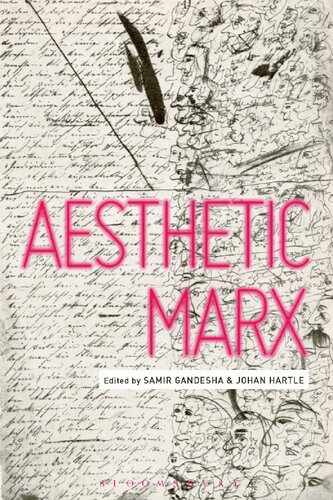Product desciption
Aesthetic Marx Samir Gandesha Johan F Hartle Editors by Samir Gandesha; Johan F. Hartle (editors) 9781350024229, 9781350024243, 1350024228, 1350024244 instant download after payment.
The whole of Marx’s project confronts the narrow concerns of political philosophy by embedding it in social philosophy and a certain understanding of the aesthetic. From those of aesthetic production to the “poetry of the future” (as Marx writes in the Eighteenth Brumaire), from the radical modernism of bourgeois development to the very idea of association (which defined one of the main lines of tradition in the history of aesthetics), steady references to Dante, Shakespeare and Goethe, and the idea that bourgeois politics is nothing but a theatrical stage: the aesthetic has a prominent place in the constellation of Marx’s thought.
This book offers an original and challenging study of both Marx in the aesthetic, and the aesthetic in Marx. It differs from previous discussions of Marxist aesthetic theory as it understands the works of Marx themselves as contributions to thinking the aesthetic. This is an engagement with Marx’s aesthetic that takes into account Marx’s broader sense of the aesthetic, as identified by Eagleton and Buck-Morss – as a question of sense perception and the body. It explores this through questions of style and substance in Marx and extends it into contemporary questions of how this legacy can be perceived or directed analytically in the present.
By situating Marx in contemporary art debates this volume speaks directly to lively interest today in the function of the aesthetic in accounts of emancipatory politics and is essential reading for researchers and academics across the fields of political philosophy, art theory, and Marxist scholarship
This book’s concern with Marx and aesthetics is twofold; it addresses both the aesthetic implications of Marx’s writings and the artistic interest in Marx. Marx’s own writings not only contain various conceptions of emancipation strongly inspired by classical aesthetics, but Marx’s own style shows a strong sense of awareness for the performative politics of writing.
Readings of Marx that focus on these aspects echo some of the recent returns to Marx in response to the crises and contradictions of contemporary capitalism. The particularity of this renewed interest in Marx, however, also marks a significant departure from the party lines of Marxist scholarship. This book, by focusing on these trends, proposes a model of reading Marx as an author whose work circles less around political economy in a narrow sense, but rather around the aesthetic: emphasizing the sensuous, the material, the formal, the performative. Such emphasis is precisely what one finds in the body of Marx’s writings as a whole if read through the lens of contemporary discussions of the aesthetico-political. It was for Marx always important, when discussing the historical formation of political subjectivity, to give special attention to the organization of the senses, of temporality, and of collective meaning and style.
It is then no wonder that Marx also keeps returning as a key source for artistic production. Ever since the artistic work of the historical avant-gardes, all the way through the monumentalized representation of Marx in state socialism, Marx still stands out as a key motif in artistic production. In the work of El Lissitzky and Alfredo Jaar, of Hito Steyerl, Alexander Kluge, and many others, Marx keeps recurring as a canonical aesthetic event.


